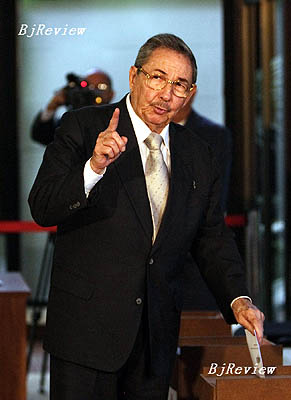|

Fidel Castro's resignation inevitably has become the focus of the international community. Cubans have made significant achievements in building socialism under the leadership of Castro. International affairs observers are curious to see what will become of Cuba without Fidel Castro.
Where will Cuba go?
When Castro fell ill and was hospitalized in August 2006, experts started discussing and debating the country's future prospects. Generally speaking, Cuba has three options.
First, it could thoroughly change its state regime just as the Soviet Union and some Eastern European countries did after the Cold War. In this manner, Cuba would adopt a so-called "democratic country" model and give up the leadership of Communist Party of Cuba, abandon socialism and embrace capitalism.
The second option would be not to change at all. The country should maintain its existing political and economic status quo and stick to its current opening-up policies, which are fairly stable and steady.
The third option would be to engage in stepwise changes. The country would generally accelerate the pace of its political and economic reforms and try to enhance its living standards with the precondition of adhering to the socialist course.
Three decisive factors can influence Cuba's future development: the will of its leaders, the claims of its people and the actions of the outside world. Many years ago, Castro said whenever an artist died, his works would still be kept on the wall. Granma, the official newspaper of the Cuban Communist Party, previously published an article that said there was no word in Cuba's dictionary that meant changing the communist direction of the country.
Now Raul Castro has succeeded his older brother. Raul Castro himself is also an outstanding revolutionary and undeviating Marxist. Cuba will continue its socialist path under his leadership. Therefore, it is not correct to predict that Cuba will enter a "post-Castro era" now that Fidel Castro has retired.
People are the engine that pushes Cuba's history forward. It has been 40 years since they have chosen the socialist road. Marxist ideology is rooted in every Cuban's heart. They now are experiencing the advantages of socialism, especially in the area of social development. For example, they have free education and medical service. As a country with a small territory, Cuba will be greatly affected by elements from the outside world. For example, the United States is a factor of extreme significance for Cuba.
It always regards Cuba as an eyesore and a thorn in its side, and it does not like the power transition there. Even before Fidel Castro became ill, the U.S. Government made a plan to accelerate the country's "track-changing" process and appropriate a large amount of funding for this purpose. The White House said Raul Castro should not be allowed to succeed his brother so that the country could make a transition to "Western democracy."
But more countries around the world support this socialist country in the middle of the Caribbean Sea. China, as a socialist country, supports Cuba's decision to stick to socialism. In the meantime, Venezuela also gives Cuba a helping hand. Other Latin American countries respect the Cuban people's choice and hope that their country can maintain a stable political situation.
Cubans will continue to hold their socialist banners and stand up for the leadership of the Cuban Communist Party. But this does not mean Cuba will be stuck where it is. Actually, the country has never stopped its instructive exploration of socialist development after the power changes in the Soviet Union and Eastern European socialist countries in the early 1990s, and it has made significant achievements since then.
Revving up reform

CASTRO STEPS DOWN: Two Cubans watch coverage of President Fidel Castro (right) speaking with visiting Brazilian President Luiz Inacio Lula Da Silva in Havana on January 15
XINHUA/AFP
Cuba's economic situation has gotten better in recent years for three reasons. The first is the active achievements the country has made since the reforms starting from the 1990s. The second is the enlarged foreign exchange incomes related to the growth of Cuba's tourism industry and the rising price of nickel on the world market. The third is the financial aid that has been offered by other countries.
Cuba's living standards remain at a fairly low level and adhere to the admeasurement policy, whereby some basic commodities are divided and distributed proportionally, because of the nearly 50 years of U.S. economic sanctions. It is predicable that Cuba's new leader must deal with the hard task of rapidly developing the economy and improving people's lives.
Since the 1990s, Cuba has undertaken a series of reform measures to cope with the economic difficulties caused by the disintegration of the Soviet Union. Those measures include attracting foreign capital, adjusting the industrial base, developing the service industry and realizing the limitations of private economic units. These reform measures are important in helping Cuba to fight its difficulties and protect its socialist system.
It must be pointed out that the Communist Party, Cuban Government and Cuban people all want the country to complete its reforms. Similar reforms in other countries, such as China and Viet Nam, have set good samples for Cuba. Persuasion and encouragement from countries that support Cuba also motivate the country.
But the reforms that started in the 1990s also have caused some problems. The widening gap between the rich and the poor is the most acute one. As a consequence, crimes such as theft of public property, financial corruption and prostitution have grown.
Compared with other Latin American countries, Cuba has a fairer means of income distribution, better social security system and a cleaner government. Fidel Castro continued to treat the negative "side effects" of social reform seriously and hoped to limit their consequences while they were not strong. He did this by trying to strengthen the teaching of ethics and control the speed of reform and opening-up, but the West regretfully regarded the measures as conservative and rigescent.
Raul Castro has considered developing the economy as his top urgent mission. He has made some remarkable moves by paying funds to farmers, increasing the prices of beef and milk on a large scale to encourage farmers, reducing fees for airport landings and jet-refueling services to attract foreign tourists, changing customs regulations so Cubans can buy electronic products and automobile parts, and forbidding policemen from taking hasty action against private taxi drivers. He also has required factories, schools and community committees to discuss how to accelerate the pace of the reforms with the precondition of adhering to the country's socialist direction, so as to achieve a consensus among the party and the Cuban people. Raul Castro has opposed excuses aimed at harassing and preventing reform.
In summary, it is predictable that with Raul Castro in power, Cuba will accelerate the speed of its reform and loosen its policies on the limitations of private economic units. But all the measures should be carried out at a deliberate pace instead of hastily. And all reforms must hold fast to the precondition of adhering to the country's socialist direction. | 